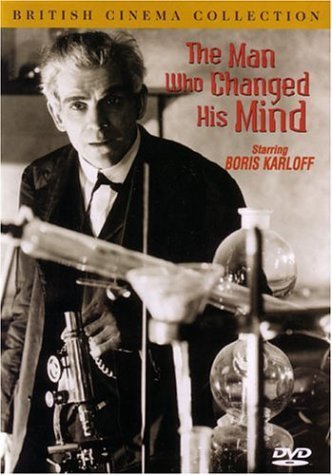The Man Who Changed His Mind
Three movies stand out in the transplant category: The Man Who Changed His Mind (1936), Change of Mind (1969), and L’homme au cerveau greffé (The Man with the Transplanted Brain, 1971). In contrast to most others, they take the assumption that humans are cerebral subjects as the core of their scenario rather than as a mere trigger for (usually violent) action, and they deal soberly with the transformations that result from a person’s survival as that person’s brain in someone else’s extracerebral body.

At the beginning of Robert Stevenson’s The Man Who Changed His Mind, we learn that the young Dr. Clare Wyatt is going to work with the aged Dr. Laurience (Boris Karloff, in one of his usual roles), a once-respectable scientist turned “mad brain specialist.” Laurience has invented a machine for relocating mental contents between brains. “Until now,” he explains to an increasingly worried Clare, “it’s never been possible to, as it were, extract the thought content from a living brain, and leave it alive but empty. I can do it; I can take the thought contents of the mind of a living animal, and store it, as you would store electricity.” As he demonstrates with two chimps, he can then transfer these contents to another living animal’s brain. When Clare realizes that Laurience wants to try this out with humans, she refuses to help him any further. The doctor seeks to convince her: “I can take a young body, and keep my own brain.” And he can do the same for her: “Think of it: I offer you eternal youth, eternal loveliness!”
The Man Who Changed His Mind stages a metonymy where the brain stands for the mind it “contains.” Although Laurience claims he can take a young body and keep his own brain, he does not transplant brains but transfers without surgery the “thought contents” that define personhood. When Laurience tells Clare that he can keep his own brain in a new young body, he makes brain stand for self or personality. Thus, even though the film enacts psychological criteria of personal identity, it is not without good reasons that it is also known as The Brainsnatcher. Both the conflict and the empirical or logical dependence between the cerebral and psychological criteria of personhood emerge here in the context of a scientist’s quest for brain-based immortality. The film both assumes and relativizes the view of humans as cerebral subjects; it alternately tells us that we are our minds and that we are our brains.

The Man Who Changed His Mind on IMDb
Watch the full movie below:








































0 comments
Sign in or create a free account